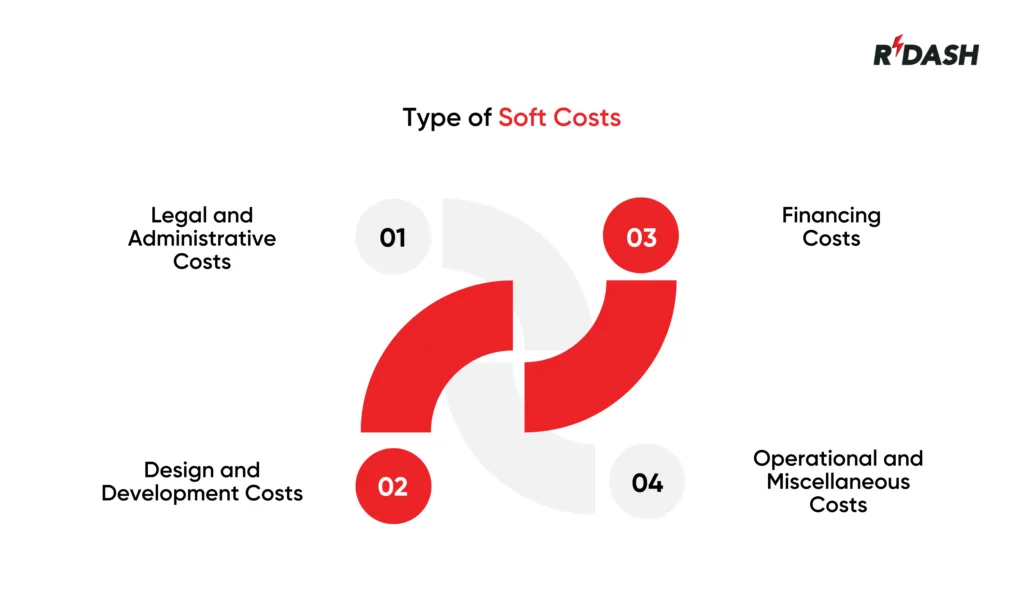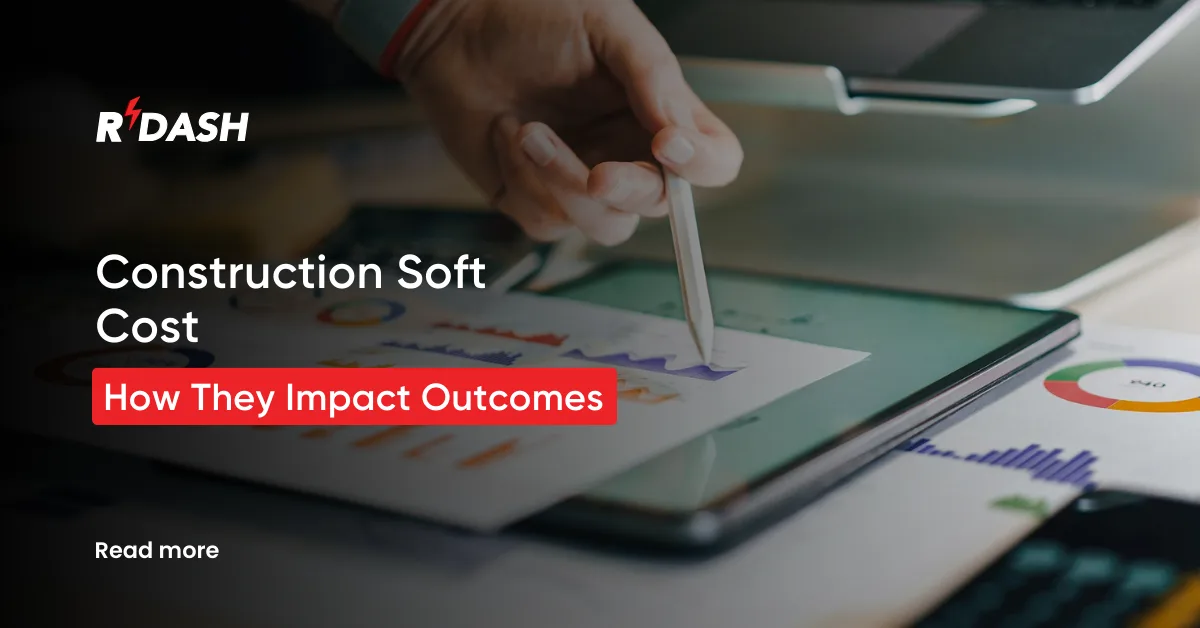What are construction soft costs?
Soft costs in construction are the expenses that do not directly contribute to the physical building process. Unlike hard costs that cover materials and labor for building, soft costs include a variety of other necessary expenditures that ensure a project’s success but don’t physically shape the structure. These can range from architectural and engineering fees to legal costs, permits, and inspections. Additionally, soft costs might cover insurance, taxes during construction, and expenses related to financing the project.
Importance of precisely estimating construction soft costs
Accurately estimating soft costs in construction projects is crucial for a number of reasons. First and foremost, it helps in developing a realistic total project budget. Underestimating these costs can lead to financial shortfalls that might jeopardize the project’s completion. On the other hand, overestimating can tie up funds that could be utilized elsewhere, affecting the overall financial efficiency of the project.
A precise estimate of soft costs aids project managers and stakeholders in making informed decisions, securing appropriate financing, and maintaining financial control throughout the construction process. It also assists in identifying potential areas where costs can be reduced without compromising on the quality or scope of the project.
Furthermore, a well-documented and accurate soft cost estimate promotes transparency with investors and clients, building trust and credibility. It ensures that all parties involved are aware of where the funds are allocated and why these expenses are necessary, which can help in smooth project execution and minimizing disputes.
In conclusion, while they may not be as visible as hard costs, soft costs are equally vital to the success of a construction project. Precise estimation of these costs is essential for financial stability, transparency, and the efficient management of resources throughout the life of the project.
Hard Costs vs Soft Costs
It is vital to distinguish between hard costs and soft costs within the construction sector. Hard costs encompass the direct expenses involved in constructing a building or infrastructure, such as labor, materials, and equipment essential for the construction activities. Conversely, soft costs, while not linked directly to the physical building tasks, are crucial for the successful management and execution of a project.
Construction soft costs type

- Legal and Administrative Costs Legal and administrative costs encompass the expenses associated with legal services, permits, and licenses required to comply with local regulations. Administrative costs cover the salaries of administrative personnel and the expenses related to project management and office operations.
- Design and Development Costs This category covers expenses related to the architectural and engineering design of the project. These costs can include payments for initial surveys, design consultations, and the creation of detailed plans and specifications that guide the construction process.
- Financing Costs Financing costs involve interest payments on loans, credit lines, and other financial products used to fund the construction project. These costs can fluctuate depending on the terms of the financing and the overall economic climate.
- Operational and Miscellaneous Costs Operational costs include expenses for utilities and building maintenance during construction. Miscellaneous costs might cover marketing, public relations, and other expenses that do not fit neatly into other categories but are necessary for the project’s success.
Practices for accurately calculating construction soft costs
Accurate estimation of soft costs is essential for maintaining the financial stability of any construction project. These costs, which are not directly tied to the physical construction but are essential for project execution, can significantly impact the overall budget if not properly managed. Here are some best practices to help ensure that you’re calculating these costs accurately:

1. Detailed Planning and Budgeting
Start with a detailed plan that outlines all potential expenses. This should encompass all expenses ranging from design and engineering fees to legal costs, insurance, and permits. The more detailed your initial budget, the less likely you will encounter unexpected costs later.
2. Regular Reviews and Updates
Soft costs can change as the project evolves. Regularly reviewing and updating the budget to reflect these changes is important. This means adjusting your estimates as you receive new information about project needs or changes in the regulatory landscape that could affect costs like permits and legal fees.
3. Consult with Experts
Consulting with experts in various fields, such as legal advisors, financial consultants, and architects, can provide insights into potential costs that you might not have considered. These professionals can offer advice on common expenses in their areas of expertise, helping you create a more accurate and comprehensive budget.
4. Utilize Historical Data
If you have access to data from previous projects, use it. Analyzing historical data can help you understand trends and commonalities in soft costs, providing a more accurate baseline for your calculations.
5. Allocate Contingencies
Always include a contingency fund in your budget for soft costs. This fund should be a percentage of the estimated soft costs and is used to cover unforeseen expenses. This proactive step can prevent budget overruns and reduce financial stress.
Improve tracking accuracy with software
One of the most effective ways to improve the accuracy of tracking soft costs is by using project management software like RDash. These tools are designed to help you keep track of all aspects of your project, including budgeting and expense tracking. Software solutions often include features that allow you to:
- Monitor Real-Time Expenses: Keep an eye on expenditures as they happen, ensuring that you stay on budget.
- Automate Reports: Automatically generate detailed reports that give insights into where your money is going, which can help in making informed decisions.
- Centralize Data: Keep all your financial information in one place, making it easier to review and manage.
- Forecast Costs: Use built-in analytics tools to predict future expenses based on current spending trends.
Using software not only helps in tracking soft costs more accurately but also enhances overall project management efficiency. By integrating these technologies into your operations, you can ensure a tighter control over your project’s budget, leading to more predictable outcomes and reduced financial risks.
FAQs
How can I track soft costs effectively during a project?
Effective tracking of soft costs can be achieved through the use of project management software that offers budget tracking and reporting features. Regularly updating your cost projections as the project progresses also helps in maintaining accuracy.
Can soft costs vary significantly between projects?
Yes, soft costs can vary based on the project’s scope, location, complexity, and regulatory requirements. Each project may have different legal, design, and administrative expenses, making it important to tailor the soft cost budget for each project.
What percentage of a construction project’s budget is typically soft costs?
Although the exact figures can differ, soft costs typically account for 20% to 40% of the overall project budget. This percentage can be higher in projects that require extensive planning, regulatory approvals, or specialized design work.
Are there any strategies to reduce soft costs in construction?
Yes, some strategies include negotiating better rates with service providers, streamlining design processes, and obtaining permits early to avoid delays. Adopting efficient project management practices can also reduce administrative and operational costs.
How do soft costs impact project funding?
Soft costs significantly influence the funding needed for a project since they constitute a portion of the entire budget that must be financed. Overlooking these costs in initial funding requests can lead to funding shortages that may stall the project.






